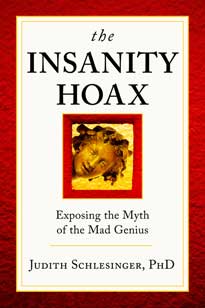Home » Jazz Articles » Book Excerpts » Why it's so easy for jazz musicians to be "bipolar"
Why it's so easy for jazz musicians to be "bipolar"
Moody, Mad, or Just Really Creative?
 We don't need to dive into the whole pool of confusion to understand why there's such a stubborn linkage between bipolar disorder and genius. We only need to see how it works in a real-life context.
We don't need to dive into the whole pool of confusion to understand why there's such a stubborn linkage between bipolar disorder and genius. We only need to see how it works in a real-life context. Let's say you're a jazz musician. According to the DSM-IV, you are experiencing a manic episode if you exhibit any three of the following seven symptoms:
1. Inflated self-esteem
2. Decreased need for sleep
3. More talkative than usual
4. "Flight of ideas" or the experience of racing thoughts
5. Distractibility or difficulty differentiating between the relevant and irrelevant
6. Increased goal-directed activity (either socially, at work, at school, or sexually)
7. Excessive involvement in pleasurable activities having a high potential for painful consequences
Here's how these symptoms could manifest in your daily life:
1. You decide to finally finish your CD, planning to quit your day job once all that money comes rolling in (symptoms 1 and 7).
2. You use every spare moment to work on it (symptom 6), including staying up all night (symptom 2).
3. You allow yourself to free-associate and generate random creative ideas (symptoms 5 and 4).
4. You talk excitedly about it (symptom 3).
5. You feel really confident about the whole thing (back to symptoms 1 and 7).
This scenario, instantly familiar to any creative person with an exciting new project, already gives you more than twice as many symptoms as you need for the diagnosis.
All that's left is for your "mania" to meet one of the following three conditions:
1. It causes marked impairment in occupational functioning or in usual social activities or relationships with others
2. It necessitates hospitalization
3. It has psychotic features
The first condition is a cinch. "Marked impairment in usual relationships" could simply mean irritating the hell out of friends and family by being so obsessed that you're oblivious to them and their needs. And if you're sleeping on that day job because of all those late nights, you've racked up some serious "occupational impairment" as well.
The other two options (involuntary hospitalization and psychosis) are the most serious. Once the definitive hallmarks of madness, they're no longer required to make the diagnosis. Neither is promiscuity or excessive spending, traditionally the two riskiest behaviors with the worst long-term consequences.
But if you loosen the net, you catch more fish. This also encourages the invention of marginal categories where people acquire the ominous blush of a serious disorder, if not its full coloration, like the "subsyndromal" person who is only a "little bit" manic-depressive and "must struggle on alone, wondering what is the matter with him."
This has absolutely nothing to do with science.
< Previous
Digging Me Digging You
Comments
Tags
For the Love of Jazz
 All About Jazz has been a pillar of jazz since 1995, championing it as an art form and, more importantly, supporting the musicians who create it. Our enduring commitment has made "AAJ" one of the most culturally important websites of its kind, read by hundreds of thousands of fans, musicians and industry figures every month.
All About Jazz has been a pillar of jazz since 1995, championing it as an art form and, more importantly, supporting the musicians who create it. Our enduring commitment has made "AAJ" one of the most culturally important websites of its kind, read by hundreds of thousands of fans, musicians and industry figures every month.






















